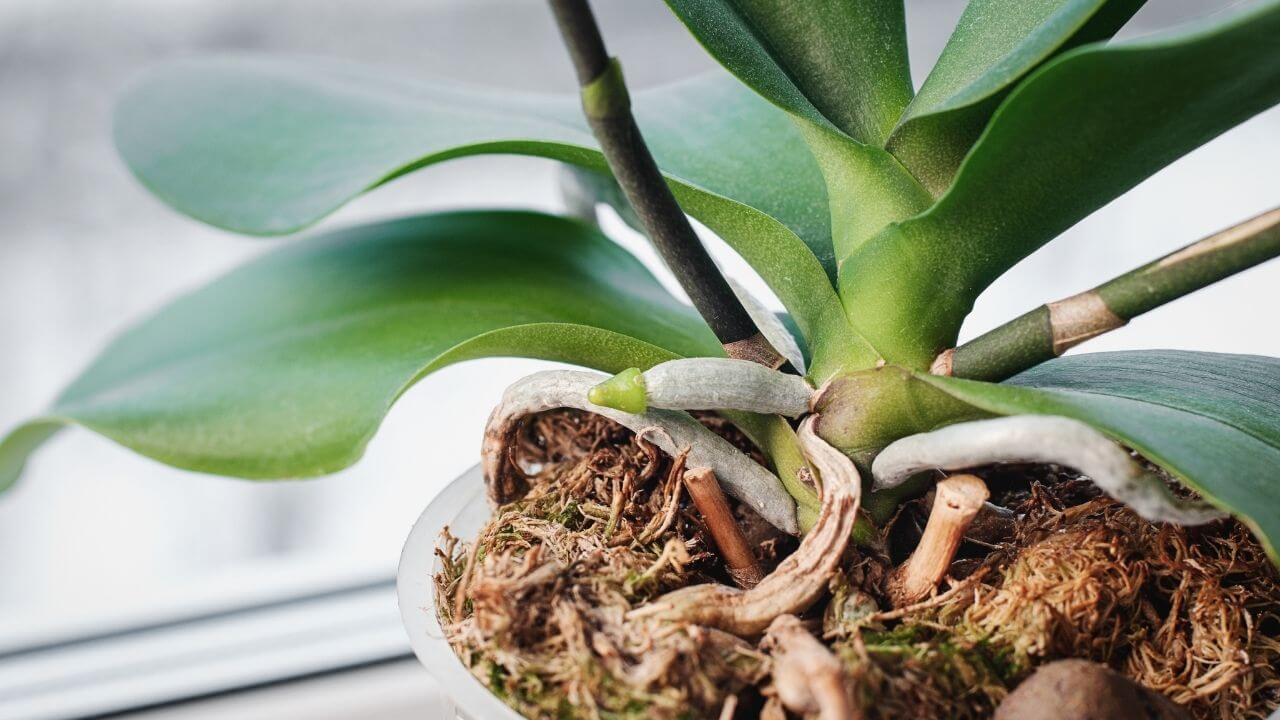Orchid flowers are some of the most beautiful flowers in the world. They come in an amazing variety of colors and shapes. Orchid blooms are beautiful, but sometimes they don’t come when they’re supposed to. So, you may wonder why orchid not blooming?
There are a few possible reasons if you’re wondering why your orchid isn’t blooming. It could be that the plant is too young, not getting enough light, or the temperature isn’t right. Luckily, you can do a few things to encourage your orchid to bloom. Please give it extra care, ensure it’s getting enough light, and keep an eye on the temperature. With patience, you should see those beautiful blooms in no time!
In this article, we’ll explain why orchid flowers may not be blooming and give some tips on how to get your orchid to bloom.
Quick Navigation
- 1 Common Reasons Why Orchid not Blooming and How to Fix Them
- 1.1 Not Getting Enough Light
- 1.2 Getting Too Much Light
- 1.3 Poor air circulation
- 1.4 The plant is too young to bloom
- 1.5 Varying Temperature
- 1.6 Providing Calcium
- 1.7 Need Proper Nutrition/Fertilizer
- 1.8 Roots Need Attention/Repotting
- 1.9 The pot is too small
- 1.10 Not enough water
- 1.11 Infected Flowers
- 1.12 Know Each Season of Your Orchid Variety
- 1.13 Cut Spent Flower Spikes for a Stronger lant
- 2 FAQ On why orchid not blooming
- 2.1 How often does orchid bloom?
- 2.2 Does an orchid rebloom?
- 2.3 When does orchid bloom?
- 2.4 What to do with orchids that don’t bloom?
- 2.5 What is the best fertilizer for orchids to bloom?
- 2.6 How often should orchids be watered?
- 2.7 Do orchids like sun?
- 2.8 What kind of sunlight does an orchid need?
- 2.9 What time of year do orchids bloom?
- 2.10 How many times a year will an orchid bloom?
- 2.11 How long do orchids live for?
- 2.12 Do indoor orchids bloom again?
- 2.13 How can you tell an orchids age?
- 2.14 How do I know if my orchid needs water?
- 2.15 Do orchids rebloom on the same stem?
- 3 Conclusion
Common Reasons Why Orchid not Blooming and How to Fix Them
Orchids are one of the most popular flowering plants globally and for a good reason. They are beautiful, attractive, and easy to grow. However, there are a few common reasons why orchid plants might not be blooming. Here are some tips on how to fix them. So, you can learn how to encourage orchid to bloom.
Not Getting Enough Light
Why will some orchids not bloom even when given enough light, while others will flourish under the same conditions? One reason may be that orchids require a different light level than other plants.
Most orchids are native to tropical climates, where the sun shines directly on them all day. Orchids need at least 6 hours of direct sunlight per day to grow and flower. If you live in a less sunny location, you can still grow an orchid by providing it with plenty of indirect light (through windows, skylights, etc.). Make sure the plant is kept moist at all times and avoid drafts.
Getting Too Much Light
If your orchid is getting too much light, it may not be blooming because orchids need a lot of light to grow. One way to check if your orchid is getting too much light is to move it to a darker part of the house. If the orchid doesn’t start blooming within a few weeks, you may need to increase the amount of light.
Poor air circulation
Poor air circulation is often the culprit for why orchids don’t bloom. When the humidity in the air is low, it can cause the leaves on orchids to become damp and soggy. This inhibits the flow of oxygen and water to the plant’s roots, which can eventually decrease blooming or even a complete stoppage of growth. To improve air circulation around your orchid, you can use fans. These windowsills are elevated off the ground or even misting systems to help distribute moisture evenly throughout your home. If you notice that your orchid isn’t booming despite good air circulation, there may be another issue at play that you need to address.
The plant is too young to bloom
There could be many reasons why a plant is not blooming. One possibility is that the plant is too young and not yet developed enough to flower. You can try to give the plant more time by growing it in a container or soil specially designed for plants rather than regular potting soil. Another possibility is that the flower itself may be gone, or perhaps the pollination process has not been successful. If you suspect that something is wrong with the flower, you can try to determine what might be causing the problem and take appropriate action.
Varying Temperature
One of the most common causes of orchids not blooming is a lack of humidity. Too much heat can also kill off orchid blooms. To help your orchid thrive, keep the temperature around 75 degrees Fahrenheit and maintain moderate humidity. Checking the orchid’s water levels and adding more if necessary will also help promote blooming.
Providing Calcium
Orchids need a lot of calcium to grow and bloom. If your orchid isn’t getting enough calcium, it may not be blooming. Check the soil for signs of deficiency, such as white patches or dry areas. Add more calcareous soil to the potting mix or use a calcium supplement.
Need Proper Nutrition/Fertilizer
A common problem with orchids is that they may not bloom because their plants are not getting the proper nutrition or fertilizer. Poor soil quality can lead to a lack of nutrients, preventing your orchid from flowering. Additionally, orchids tend to require a lot of fertilizer to thrive. If you are having trouble getting your orchid to bloom, it might be helpful to check the condition of its soil and make sure it is receiving the correct amount of nutrients. Alternatively, you could try using a particular fertilizer specifically designed for orchids.
Roots Need Attention/Repotting
One of the most common reasons why orchids don’t bloom is because the roots are not getting enough attention. Over time, the soil can become compacted and too dry, damaging the roots. If you notice that your orchid is not flowering as often as it used to, there may be a good reason. One solution is to give the orchid a good repotting; this will help to improve circulation and increase moisture levels in the soil.
The pot is too small
The most common reason orchids will not bloom is because the pot they are in is not large enough. Many orchid growers recommend starting with a pot at least 2 inches larger than the orchid’s root ball. If the orchid still does not bloom, then the problem may be with the plant itself, and it may need to be repotted.
Not enough water
There are many reasons why orchids may not be blooming, but one common problem is that the plant isn’t getting enough water. If you notice that your orchid isn’t producing flowers and the leaves look droopy and pale, it might be time to give the plant a good soaking. You can also try increasing the watering frequency to see if that helps.
Infected Flowers
There are many possible causes for why an orchid may not be blooming. Still, some of the most common reasons include infection by a fungus, bacterial infection, or an incorrect watering schedule. If you suspect that one of these issues is causing your orchid’s decline in blossoming, there are a few things you can do to try and rectify the problem. One option is to contact a professional orchid specialist for help diagnosing and correcting the issue. Additionally, you can attempt to treat the flower with fungicides or antibacterial products before it goes into decline. Ultimately, it is essential to consult with an expert if you are struggling to get your orchid flowering properly.
Know Each Season of Your Orchid Variety
Orchids come in various shapes and colors, each with its unique characteristics. Knowing which season your orchid is in will help you determine what needs to be done to ensure flowering.
Spring orchids are typically the first to bloom, followed by summer orchids. Autumn orchids usually last the longest and may not flower if temperatures don’t warm up enough for them to do so. Winter orchids die back during the winter months.
By understanding when your orchid is in which season, you can ensure that you provide it with the correct environment and care. Checking the orchid’s water levels regularly, adjusting the light fixture if necessary, and keeping a close eye on humidity levels can all help ensure flowering success.
Cut Spent Flower Spikes for a Stronger lant
There could be many reasons why orchid plants are not blooming, but one of the most common problems is that the flowers have been cut off too short. This can leave the plant with a weak and spindly stem, which will not be able to support the flower head. It is essential to remove spent flower spikes before they become too long and weak to prevent this from happening. Doing so will give your orchid plant a more robust stem, which will result in better blooming.
FAQ On why orchid not blooming
How often does orchid bloom?
Orchids come in a variety of shapes and sizes. The most common type is the terrestrial orchid, which grows on the ground. Other types include aerial orchids, which grow on trees, and aquatic orchids, which live in water.
Orchid blooms vary in frequency depending on the variety and climate. In general, terrestrial orchids will bloom every two to three years. Aerial orchids may bloom every year or every other year, while aquatic orchids may only Bloom once every few years.
Does an orchid rebloom?
Yes, an orchid will rebloom if the root system is healthy and the plant is given the right conditions. An orchid needs bright light, consistent water and fertilizer, and a dry place to rest. You can also try moving the orchid to a different location or watering it less frequently.
When does orchid bloom?
Orchids are a type of succulent plant found in various parts of the world. They come in multiple shapes, sizes, and colors and can be found blooming at different times of the year.
Most orchids bloom during the late winter or early spring. The blooms come in various colors, including white, pink, yellow, and light purple.
What to do with orchids that don’t bloom?
The majority of orchids do not bloom because they have not been fertilized. You can fertilize your orchid by using a water-soluble fertilizer. Another reason orchids don’t bloom is that they are not getting enough light. The best way to increase the light your orchid receives is to move it closer to a window.
What is the best fertilizer for orchids to bloom?
Orchids are beautiful, easy to care for, and can provide a long-term flower display. However, there can be times when orchids will not bloom. This can be due to some reasons, but one of the most common is a lack of fertilizer.
There are many types of orchid fertilizer available on the market, and each has its benefits. One type of orchid fertilizer that is often recommended is compost tea. This type of fertilizer is made from decomposed organic matter, which provides nutrients to plants effectively. In addition to compost tea, other types of orchid fertilizers include fish emulsion, seaweed extract, bone meal, and blood meal.
How often should orchids be watered?
The most common cause why orchids are not blooming is not getting enough water. Orchids need to be watered regularly, but it is important to remember that they do not like getting wet when they are in the water. The best way to water orchids is to slowly drip water onto the roots rather than pouring it on top of them.
Do orchids like sun?
Do orchids like sun? One of the most common questions people ask about orchids is why their plants are not blooming. The answer to this question depends on the type of orchid and how much sunlight it receives.
For terrestrial orchids, which grow on the ground, sunlight is essential for photosynthesis. The leaves of terrestrial orchids grow directly out of the ground, so they are constantly in contact with sunlight. If you want to keep an orchid flowering all year round, it’s important to ensure it gets plenty of sun exposure.
Many people think that tropical orchids need less sunlight than other plants because they live in a warm climate. However, tropical orchids also need plenty of sunlight to grow and thrive. If you live in a warm climate and want to keep an orchid flowering all year round, make sure it gets direct sunlight during the morning and early afternoon hours.
Suppose your orchid is growing indoors, whether in a pot or a container. It doesn’t need as much sunlight as outside plants. If your orchid is growing in direct sunlight, it will likely be blooming more frequently. If your orchid is growing in indirect sunlight, it may not be blooming as much. You can try moving the orchid to a spot with more sunlight, or you can increase the amount of light it receives by using a grow light.
What kind of sunlight does an orchid need?
Orchids need direct sunlight to flower. If your orchid is receiving too much indirect light, it may not be blooming. To test if your orchid needs more light, place it in a bright window and watch for blooming. If the orchid does not start to bloom within a week, increase its exposure to sunlight.
What time of year do orchids bloom?
Orchids are a type of flowering plant that blooms in the springtime. They need warm temperatures and lots of sunlight to grow and bloom.
Many orchid blooms happen during the late winter or early spring, but there are some that can flower as late as midsummer. If your orchid isn’t blooming, it may just need more light or water. You can try moving the plant to a brighter spot in your garden, adding more water when the soil feels dry, or giving it more fertilizer.
How many times a year will an orchid bloom?
Orchids typically bloom once a year, although some species may bloom more than once annually. The blooming season for most orchids is spring, although there are a few species that bloom in summer or autumn.
How long do orchids live for?
Orchids are hardy, beautiful, and have a long lifespan. Orchids can live for many years, with some species known to live for over 100 years. Some orchid varieties can live for up to 50 years! That being said, there are a few things that can Affect an orchid’s blooming ability. However, the average lifespan of an orchid is between 4 and 6 years.
Do indoor orchids bloom again?
It is possible for indoor orchids to bloom again, but it may take some time and effort. Some things you can do to help the process include:
- Water the orchid regularly, especially in the early stages of bloom;
- Remove any dead leaves or flowers;
- Provide a humid environment; and
- Keep the orchid away from direct sunlight.
How can you tell an orchids age?
There are a few ways to tell an orchid’s age, but the most reliable method is to look at the basal leaves. As orchids grow, their basal leaves will become smaller and less divided. Younger orchids will also have smaller petioles (the stem attaches the leaf to the stem).
How do I know if my orchid needs water?
When you first get an orchid, it will likely be in a pot with very little water. The plant will need to adjust to its new environment and grow roots. Don’t give the orchid too much water at once – slowly trickle it in over a few days. If the orchid does not seem to be getting enough water, check the potting mix and make sure there is plenty of moisture. If the orchid is still not blooming, it may need more light than it is receiving. Move the orchid to a brighter location.
Do orchids rebloom on the same stem?
Orchids can rebloom on the same stem, but the chances of this happening are not very high. If the orchid is healthy and in the right conditions, the plant can produce another flower stalk. However, it is more likely that the orchid will produce a new flower stalk on a different stem.
Conclusion
There are many reasons why orchids may not bloom, but some of the most common include insufficient water, lack of nutrients, and not enough light. By understanding the needs of your orchid and taking steps to address any problems, you can encourage your orchid to bloom.

My name is Md Deloar Hossain and I’m the creator of Club Gardening, designed for all your gardening ideas, gardening product reviews, and a place to help you find the best gardening experience possible.


